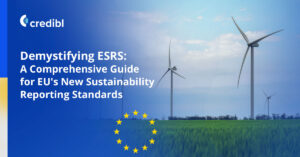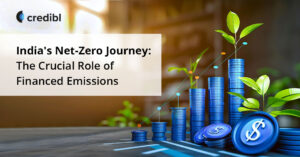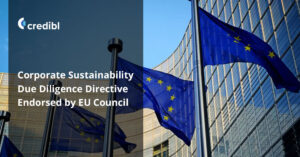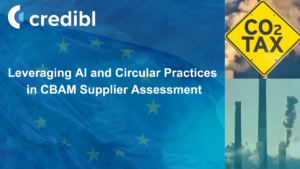Welcome to this first part of the blog post series where we will discuss ESG, a term that has become increasingly important in business and investing. This post will provide a glossary of ESG terms to help you better understand this rapidly evolving field.
Whether you’re an investor, business leader, or simply curious about ESG, this post will provide you with a foundation for understanding the key concepts and terminology.
So let’s dive in and explore the world of ESG together!
1.5°: The Paris Agreement aims to limit global warming to 1.5°C above pre-industrial levels to reduce the most significant impacts of climate change. A 2018 IPCC report states that achieving this goal requires a 45% decrease in net emissions by 2030 and net zero emissions by 2050.
Activity Metrics: Activity Metrics measure resource efficiency and management effectiveness, including high-level business data such as employees and customers, and industry-specific data like plant capacity utilization.
Alternative Energy Target: A government’s goal is to increase the share of renewable energy in its power generation portfolio.
Alternative Fuels: The fuels that are derived from sources other than petroleum. Often they produce less pollution. Examples include ethanol, methanol, vegetable oils, and waste-derived oils.
Biodiversity Offset: Biodiversity Offsets compensate for the loss due to economic activity but are only suitable for projects that have applied the mitigation hierarchy framework for conservation.
Bioeconomy: The Bioeconomy is defined as using biological resources for products and services across economic sectors while promoting a sustainable economy, including related knowledge, science, technology, and innovation.
Carbon Credit: A carbon credit is a tradable permit that allows for the emission of 1 ton of carbon dioxide or an equivalent amount of another greenhouse gas. Countries and businesses participating in emissions reduction agreements can buy or sell these credits to manage their allotted emissions.
Carbon Disclosure Project / CDP: The UK-based organization, CDP enables global companies and governments to report environmental impacts. CDP uses the data to report on environmental risks and opportunities for improvement.
Carbon Finance: Carbon finance funds GHG emission reduction projects using financial instruments such as allowances or carbon offsets for regulatory compliance or voluntary emissions reduction.
Carbon Footprint: The total amount of Emissions that individuals or entities directly or indirectly cause.
Carbon Labeling: Carbon labeling describes a product’s CO2 emissions from production, transport, and disposal. It demonstrates a company’s effort to reduce the product’s carbon footprint and promote sustainability to consumers, employees, and investors.
Carbon Offset: Carbon offsetting counterbalances carbon emissions by planting trees, funding reduction projects, or buying credits, along with energy conservation. This often supports developing countries in preventing future emissions.
Circular Economy: A circular economy is an economic model that prioritizes resource efficiency by minimizing waste and maximizing the use of renewable and reusable resources.
Circular Inflow: Circular Inflow refers to the inputs of materials and resources into a system in a circular economy. It can be Renewable Inflow, used at a rate in line with natural cycles of renewability, or Non-Virgin Inflow. The circularity of an organization is evaluated based on the percentage of Circular Inflow and Outflow of materials used.
Circular Outflow: Circular Outflows are evaluated to measure the circularity of a system, ensuring products and materials have full recovery potential and extend their economic lifetime after their technical lifetime.
Climate Disclosure Standards Board / CDSB: CDSB (Climate Disclosure Standards Board) is a special initiative of CDP that provides a framework for companies and cities to disclose climate change-related financial risks and opportunities to investors, helping them to make more informed decisions.
Climate Finance: Climate finance involves funding efforts to combat climate change from public, private, or other sources, often called for by international agreements like the UNFCCC, Kyoto Protocol, and Paris Agreement, with a focus on vulnerable communities.
Coalition for Environmentally Responsible Economies / CERES: CERES is a non-profit organization that works with investors and environmental, religious, and public interest groups to promote sustainable investment policies and address issues like climate change, water scarcity, pollution, and workplace inequality.
Common Agricultural Policy / CAP: The Common Agricultural Policy (CAP) is a set of policies launched in 1962 to increase agricultural productivity and protect farmers in all EU nations through income support.
Context-Based Sustainability: an approach to corporate sustainability management that takes account of social, economic, and environmental
Continuous Emissions Monitoring System / CEMS: the equipment necessary to monitor the gas or Particulate Matter concentration or Emissions rate in order to comply with limitations and standards set by the EPA.
Convention on International Trade in Endangered Species of Wild Fauna and Flora / CITES: An international agreement between countries, entered into in 1975, whose goal is to ensure that the global trade of wild animals and plants does not threaten the species’ survival.
Corporate Governance: Corporate governance is the framework of rules and practices that guide a corporation’s direction and performance, with the board of directors’ relationship with shareholders and management being crucial.
Corporate Reporting Dialogue / CRD: The Corporate Reporting Dialogue is an International Integrated Reporting Council platform that promotes coherence, consistency, and comparability among corporate reporting standards and frameworks.
Corporate Social Responsibility / CSR: Corporate sustainability refers to the practices implemented by a corporation to manage the social, environmental, and economic impacts of its operations and promote sustainability, with some aspects required by law and others voluntary.
Corporate Sustainability Index / ISE: A tool launched in 2005 in Latin America used to rate and compare companies in their performance on issues related to social justice, Corporate Governance, sustainability, and Environmental Impact.
Corruption Perceptions Index / CPI: The CPI is an index created by Transparency International in 1995 to rank countries by perceived corruption. Scores range from 0 (highly corrupt) to 10 (clean), based on expert assessments and opinion surveys of corruption in the public sector, including officials and politicians.
Cradle to Cradle: It is a sustainability framework that aims to eliminate waste through design and science. Its main ideas include recycling everything into technical or biological nutrients and using cleaner and renewable energy sources. The framework involves retrieving products at the end of their useful life and turning them into new products of equal or greater value.
Cradle-to-Gate Inventory: This refers to the partial life cycle of an intermediate product, from material acquisition to when it leaves the organization’s gate, such as after the production.
Cradle to Grave: It is a sustainability framework that looks at a product’s impacts throughout its lifespan, including raw material extraction, manufacturing, and disposal.
We hope that this list helped you in your ESG journey. Feel free to connect with us at [email protected] to share any ESG terms you would like to add to the list.
Stay tuned for the next part of the ESG Glossary series.







